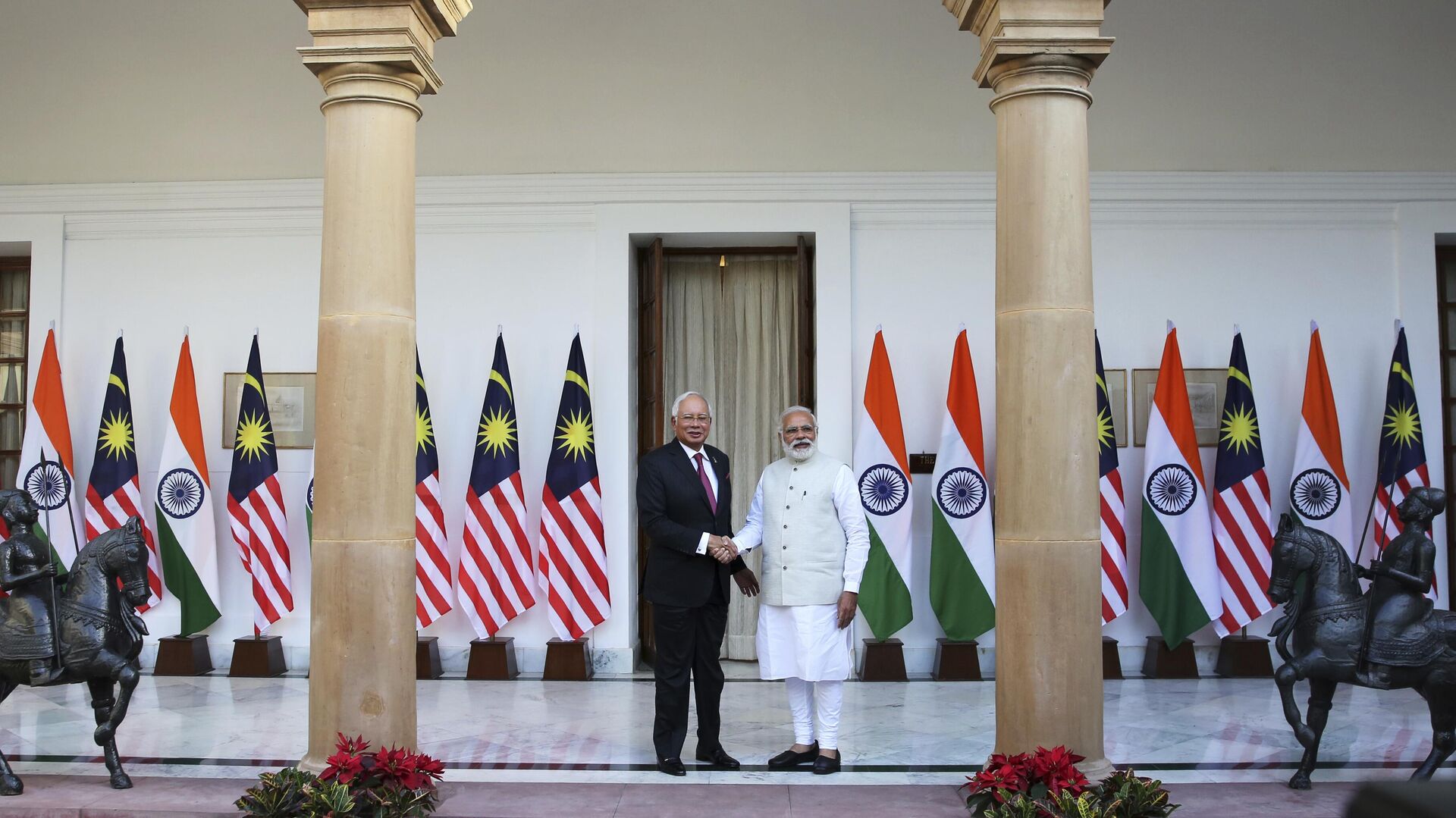https://sputniknews.in/20231214/restoring-relations-with-india-is-malaysias-best-interest-expert-5836812.html
Restoring Relations With India is in Malaysia's Best Interests: Expert
Restoring Relations With India is in Malaysia's Best Interests: Expert
Sputnik India
Malaysia has moved on from accusing India of invading Kashmir to emerging as India's third-largest Asian trading partner. Sputnik India looks at the factors behind the shift in relations between the two Asian countries.
2023-12-14T20:53+0530
2023-12-14T20:53+0530
2023-12-18T10:53+0530
world news
narendra modi
rajnath singh
india
malaysia
asean
ministry of external affairs (mea)
indonesia
government of india
ministry of defence (mod)
https://cdn1.img.sputniknews.in/img/07e7/09/13/4337931_262:0:3903:2048_1920x0_80_0_0_7e5bbe6b5248ef6f385905f837ef7d3c.jpg
Vice-minister P. Kumaran of India's Ministry of External Affairs (MEA) stated on Tuesday at the India-ASEAN Start-up Summit 2023 that Malaysia is India's third-largest trading partner in Asia, with trade between the two countries reaching US$20 billion (RM93.7 billion) in 2022–2023."The trade basket is expanding, given the contemporary and complementary nature of our requirements and emerging opportunities. Our investment ties are also strong and growing," Kumaran stated while addressing the Summit.India Boycotts Palm OilIndia discouraged the import of large quantities of Malaysian palm oil as a result of Mahathir's remarks. Protests against Malaysian goods went viral among Indians. A central Indian vegetable oil trade body warned its 875 members not to purchase palm oil from Malaysia shortly after it banned the country's imports of the oil, citing the government's potential for retaliation.Noting the success of spontaneous boycotts of Malaysian products in India, the Ambassador stated that “The primary cause of Malaysia's altered policy towards India is the shift in leadership.”Historical Relationship“India and Malaysia have deep cultural and historical ties that date back centuries. The partnership has developed into a modern, multifaceted, and contemporary one while preserving its cultural heritage and connections," said Bhatia. "In fact, the year 2023 will be recorded as a year when some positive steps were taken, both for enhancing political and defence cooperation. Meanwhile, India also maintains its high regard for ASEAN, of which Malaysia is an important member,” the expert added.Change in Malaysia's Approach Towards India“Malaysia, one of the original members of ASEAN, played a significant role in assisting India with its Look East policy, which was later turned into an Act East Policy and then into an Indo-Pacific strategy. Nonetheless, more exchanges at the political level are required”, the ambassador noted.“Restoring relations with India is in Malaysia's best interest”, Bhatia concluded, following significant international events where the international community, including eminent international organisations, expressed gratitude for India's role.Future Relations“Malaysia must continue to respect India's political and diplomatic sensitivities concerning Kashmir. With the Supreme Court's recent decision to revoke Article 370 and address the Jammu and Kashmir issue, this matter is now closed for India. Malaysian government would undoubtedly welcome this and move forward in terms of developing cooperation with India”, said the ambassador.“Expanding their defence-related training programmes and exchanging high-ranking dignitaries should be the main focus of India and Malaysia's defence cooperation, as it is crucial to their bilateral relationship” Bhatia remarked.
https://sputniknews.in/20231117/how-india-contributes-to-vanilla-islands-maritime-security--why-it-is-crucial-for-ior-5350999.html
india
malaysia
asean
indonesia
Sputnik India
feedback.hindi@sputniknews.com
+74956456601
MIA „Rossiya Segodnya“
2023
Swapna Nair
https://cdn1.img.sputniknews.in/img/07e7/09/12/4320104_0:0:681:681_100x100_80_0_0_ca8a7d4d582609272840ffdd1cde7278.jpg
Swapna Nair
https://cdn1.img.sputniknews.in/img/07e7/09/12/4320104_0:0:681:681_100x100_80_0_0_ca8a7d4d582609272840ffdd1cde7278.jpg
News
en_IN
Sputnik India
feedback.hindi@sputniknews.com
+74956456601
MIA „Rossiya Segodnya“
Sputnik India
feedback.hindi@sputniknews.com
+74956456601
MIA „Rossiya Segodnya“
Swapna Nair
https://cdn1.img.sputniknews.in/img/07e7/09/12/4320104_0:0:681:681_100x100_80_0_0_ca8a7d4d582609272840ffdd1cde7278.jpg
vice-minister p. kumaran, india's ministry of external affairs, india-asean start-up summit 2023, malaysia, india's third-largest trading partner in asia, mahathir mohammad, un general assembly, india, bilateral trade, commerce, india palm oil boycotts, malaysian prime minister abdul razak hussein, malaysian prime minister mahathir mohamad's leadership, former ambassador rajiv bhatia, distinguished fellow, gateway house, asean, malaysia, look east policy, act east policy, indo-pacific strategy, indian defence minister rajnath singh, international events, international community, malaysian education minister zambry abdul kadir, jammu and kashmir issue, asean countries, defence cooperation
vice-minister p. kumaran, india's ministry of external affairs, india-asean start-up summit 2023, malaysia, india's third-largest trading partner in asia, mahathir mohammad, un general assembly, india, bilateral trade, commerce, india palm oil boycotts, malaysian prime minister abdul razak hussein, malaysian prime minister mahathir mohamad's leadership, former ambassador rajiv bhatia, distinguished fellow, gateway house, asean, malaysia, look east policy, act east policy, indo-pacific strategy, indian defence minister rajnath singh, international events, international community, malaysian education minister zambry abdul kadir, jammu and kashmir issue, asean countries, defence cooperation
Restoring Relations With India is in Malaysia's Best Interests: Expert
20:53 14.12.2023 (Updated: 10:53 18.12.2023) Malaysia has moved on from accusing India of invading Kashmir to emerging as India's third-largest Asian trading partner. Sputnik India looks at the factors behind the shift in relations between the two Asian countries.
Vice-minister P. Kumaran of India's Ministry of External Affairs (MEA) stated on Tuesday at the India-ASEAN Start-up Summit 2023 that Malaysia is India's third-largest trading partner in Asia, with trade between the two countries reaching US$20 billion (RM93.7 billion) in 2022–2023.
"The trade basket is expanding, given the contemporary and complementary nature of our requirements and emerging opportunities. Our investment ties are also strong and growing," Kumaran stated while addressing the Summit.
In 2019, former Prime Minister of Malaysia Mahathir Mohammad targeted India at the UN General Assembly, declaring that "New Delhi had invaded and occupied Kashmir." The unexpected and misleading comments caused a backlash in India that severely damaged relations between the two countries, especially in the area of bilateral trade and commerce.
“During the tenure of Malaysian Prime Minister Abdul Razak Hussein, ties were both stable and growing. However, under Malaysian Prime Minister Mahathir Mohamad's leadership, bilateral relations between Malaysia and India were strained,” former Ambassador Rajiv Bhatia, a distinguished fellow at Gateway House, told Sputnik India.
India discouraged the import of large quantities of Malaysian palm oil as a result of Mahathir's remarks. Protests against Malaysian goods went viral among Indians. A central Indian vegetable oil trade body warned its 875 members not to purchase palm oil from Malaysia shortly after it banned the country's imports of the oil, citing the government's potential for retaliation.
Noting the success of spontaneous boycotts of Malaysian products in India, the Ambassador stated that “The primary cause of Malaysia's altered policy towards India is the shift in leadership.”
“India and Malaysia have deep
cultural and historical ties that date back
centuries. The partnership has developed into a modern, multifaceted, and contemporary one while preserving its cultural heritage and connections," said Bhatia.
"In fact, the year 2023 will be recorded as a year when some positive steps were taken, both for enhancing political and defence cooperation. Meanwhile, India also maintains its high regard for ASEAN, of which Malaysia is an important member,” the expert added.
“Before COVID, bilateral trade was valued at $15–$20 billion. India has made significant financial investments in Malaysia through several Indian companies," the ambassador said. "In addition, Malaysian companies have also been heavily involved in other sectors, such as infrastructure. Therefore, this is a two-way street,” Bhatia said.
Change in Malaysia's Approach Towards India
“Malaysia, one of the original members of ASEAN, played a significant role in assisting India with its Look East policy, which was later turned into an
Act East Policy and then into an
Indo-Pacific strategy. Nonetheless, more exchanges at the political level are
required”, the ambassador noted.
Referring to the visits of Indian Prime Minister Narendra Modi this year to Malaysia followed by that of Indian Defence Minister Rajnath Singh and MOS in MEA, the Ambassador suggests that “initiatives are underway to find common ground for the normalisation of bilateral relations. With any luck, even more high-level interactions in 2024 will put the relationship on a more upward trajectory.”
“Restoring relations with India is in Malaysia's best interest”, Bhatia concluded, following significant international events where the international community, including eminent international organisations, expressed gratitude for India's role.
“Indian citizens will be able to enter Malaysia without a visa for 30 days starting on December 1, 2024, stated Malaysian Education Minister Zambry Abdul Kadir. This action indicates an intent to improve interpersonal communication and connectivity” the Ambassador noted.
“Malaysia must
continue to respect India's political and
diplomatic sensitivities concerning Kashmir. With the Supreme Court's recent decision to revoke Article 370 and address the
Jammu and Kashmir issue, this matter is now closed for India. Malaysian government would undoubtedly welcome this and move forward in terms of developing cooperation with India”, said the ambassador.
On the threat posed by terrorism, Bhatia pointed out that “it is not only significant for India but also for the other ASEAN countries, Malaysia and India should concentrate on strengthening and energising through various mechanisms.”
“Expanding their defence-related training programmes and exchanging high-ranking dignitaries should be the
main focus of
India and Malaysia's defence cooperation, as it is
crucial to their
bilateral relationship” Bhatia remarked.
Given that India has developed into a global economic powerhouse and is a major player in global peace and security, the Ambassador said, “The decision by the leaders of Malaysia and India to resume amicable relations will be a fascinating and consequential package for the future.”



